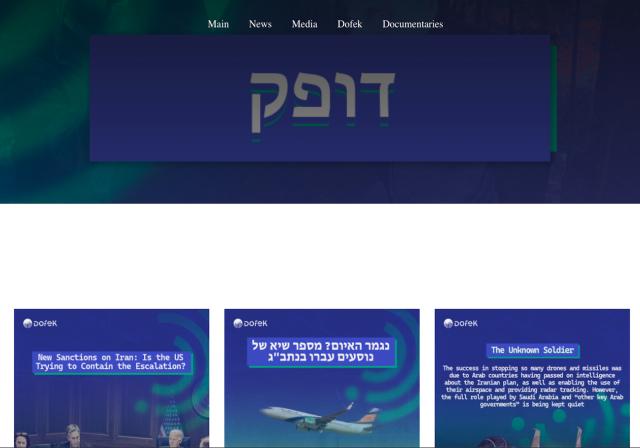In January 2024, the unveiling of a Hebrew-language news website named "Dofek TV" (dofek.tv) raised significant concerns among Israeli cyber-security experts. Initially portrayed as a platform committed to addressing Jewish affairs both in Israel and globally, the site quickly drew suspicion for the origins and intent of its content.
Launched on January 17, Dofek TV boasted a full suite of digital assets, including accounts on major social networks like Facebook, Twitter, Instagram, TikTok, and YouTube. These platforms began disseminating content heavily laden with extreme messaging, sowing divisions within Israeli society and promoting narratives of despair and disillusionment.
ברשת DOFEK שמתחזה לפלטפורמת חדשות בעברית ומפעיליה רשומים בלבנון, הדהדו את המסר שהעימות העקיף עם איראן הופך לישיר. בימים המתוחים שלפני התקיפה העלה חשבון הטוויטר בעל הוי הכחול מהדורת חדשות שהוכנה באמצעות בינה מלאכותית והבטיח כי "ישראל תגיב על כל תקיפה איראנית". >> pic.twitter.com/EUOFXhL55O
— פייק ריפורטר | FakeReporter (@FakeReporter) April 16, 2024
An investigative report by "Fake Reporter" has highlighted troubling findings about the operations of Dofek TV. The investigation pinpointed at least two operators based in Lebanon, with certain posts showing linguistic markers indicative of Arabic and Persian influences. The presence of such foreign control over media that reaches tens of thousands of Israelis has been described by experts as a grave concern.
Dofek TV's operation appears sophisticated, utilizing high-quality graphics and a broad social media footprint to ensure wide dissemination of its content. However, discrepancies in the Hebrew used in their publications—garbled syntax, unusual phrases, and spelling errors—betray a lack of native fluency and suggest external authorship. Recent uploads have even incorporated AI-driven video content, further blurring the lines of authenticity.
Curious about Jeff Helper's views and perceptions. Tune in for the episode on YouTube, available April 24th, 2024.
— Dofek | דופק (@dofek_tv) April 17, 2024
רוצים לדעת יותר על רעיונותיו של ג'יל הלפר? הישארו מעודכנים!
הפרק המלא יהיה זמין לצפייה ביוטיוב ביום שני הקרוב 22\04\24#Dofek #jeffhelper #israel pic.twitter.com/pUrGOypxPA
The website's operators, under the guise of impartiality, claim to represent a voice for the Jewish community that stands against violence, corruption, and historical injustices. Yet, the narrative often veers into provocative territories, with certain unpublished articles hinting at an anti-Israel stance. Titles such as "How long can the occupation bear the losses of us" and "Ideology and the flood of al-Aqsa" suggest a clear pro-Palestinian narrative.
Despite efforts to mask their activities, the digital trail left by Dofek TV has been anything but covert. The domain registration through GoDaddy and a basic WordPress setup were easily traceable, with internal references designed to obfuscate the true operators. Notably, one of the usernames linked to the site is "Fadel," a non-Israeli name, adding another layer of suspicion regarding the operators' origins.
Saudi Arabia’s full role is kept quiet.
— Dofek | דופק (@dofek_tv) April 16, 2024
התפקיד השלם שמילאה סעודיה בהדיפת המתקפה נשאר סוד#Dofek #israel #saudiarabia pic.twitter.com/8nG2sjGGKr
Content errors concerning Israeli political realities have raised alarms about the intent behind Dofek TV's messaging. Misidentifications of Israeli officials and misinterpretations of policies, such as those related to the ultra-Orthodox community and military conscription, reveal a deep disconnect from Israeli societal nuances.
The state's response has been cautious. The Ministry of Justice has reiterated that detecting and analyzing foreign interference is a priority handled by security forces. Information regarding such interference is dealt with swiftly to mitigate any potential harm. However, in an interview with Walla News, Ahya Shatz, CEO of Fake Reporter, criticizes the lack of proactive measures by the state and social networks to combat this form of cyber warfare effectively. According to Shatz, the ongoing visibility and influence of hostile foreign narratives via sponsored social media content pose a direct threat to national security and societal harmony.
As this situation unfolds, the Israeli public remains exposed to potentially manipulative foreign content designed to inflame societal divides. The effectiveness of the state's response in curbing this influence and safeguarding the public discourse will be crucial in maintaining national unity and security.


